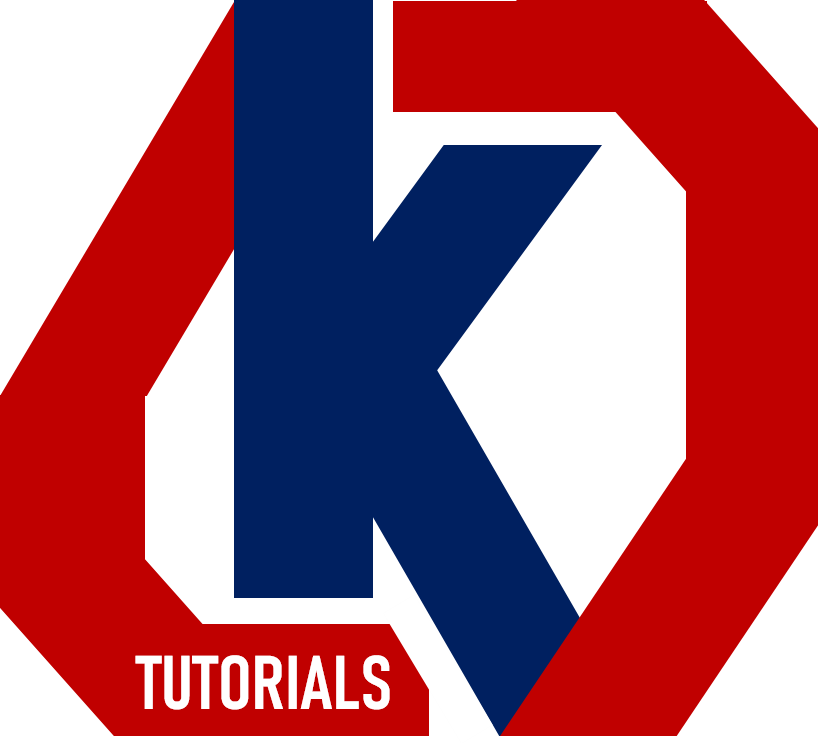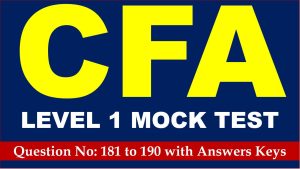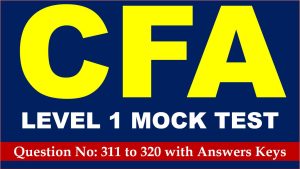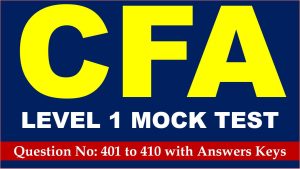Hi CFA Aspirants, welcome to AKVTutorials. Are you preparing for CFA Level 1, 2, 3 exams for making a career in CFA (Charted Financial Analyst). According to CFA Wikipedia, CFA The Chartered Financial Analyst (CFA) program is a postgraduate professional certification offered internationally by the American-based CFA Institute. A candidate who successfully completes the program and meets other professional requirements is awarded the “CFA charter” and becomes a “CFA charter holder”. Therefore, you need CFA Study Notes and Free CFA Level 1 Practice Test 14 Questions Bank Answer Keys AMBIPi.
In this article, you will get Free CFA Level 1 Mock Exam Practice Questions.
Free CFA Level 1 Mock Practice Exam Questions Bank
Free CFA Level 1 Practice Question No: 131:
Which of the following is true about Standard III (B) – Duty to Employer?
Option A : It prohibits a departing employee from making arrangements to enter independent practice prior to leaving current employment.
Option B : It precludes a member from entering into an independent business that is in direct competition with the employer.
Option C : It requires the employee to obtain written permission from the employer as well as the outside entity before entering independent practice.
Option D : It requires departing employee to give all the details about the independent practice before leaving the current employment.
Show/Hide Answer
Option C : It requires the employee to obtain written permission from the employer as well as the outside entity before entering independent practice.
Standard III (B) – Duty to Employer – does not preclude a member from entering into independent practice while still employed. It does require the employee to obtain written permission from the employer as well as the outside entity before doing this. It does not prohibit a departing employee from making arrangements to enter independent practice prior to leaving current employment, as long as such preparations do not constitute a breach of loyalty toward the employer.
CFA Level 1 Exam Question No: 132:
Standard III (D) – Disclosure of Additional Compensation Arrangements – requires members to provide complete disclosure to their employer about any additional compensation arrangements. In order to abide by this, you must:
Option A: Inform the legal department in writing.
Option B: Inform your immediate supervisor in writing or by email.
Option C: Inform senior management orally or in writing.
Option D: Inform your supervisor in writing, by email or orally.
Show/Hide Answer
Option B : Inform your immediate supervisor in writing or by email.
Standard III (D) requires written notification to the employer. This includes any form of communication that can be documented.
Free CFA Level 1 Mock Exam Question No: 133:
A manager who pays a higher commission than would normally be paid to purchase the goods or services is said to be ________ services.
Option A: exploiting.
Option B: undercharged for.
Option C: paying up for.
Option D: fee-bound for.
Option E: none of these answers.
Show/Hide Answer
Option C : paying up for.
A manager who pays a higher commission than would normally be paid to purchase the goods or services is said to be paying up for services. This practice is a violation of fiduciary duties to the client. However, various countries’ securities laws permit a manager to pay up for goods and services without violating the manager’s fiduciary duty so long as the requirements of the law are followed.
CFA Level 1 Free Practice Question No: 134:
Latham has been following a publicly traded oil firm, Techron Oil. Recently, he read a review about the oil fields in Venezuela, to the effect that the actual oil content of the fields across the country might be as much as 35% higher than previously estimated. Techron owns sizable properties in Venezuela and Latham has concluded that the research report implies that Techron might have as much as a million gallons a day in excess capacity that has not been factored into the stock price. In his report, he properly attributed the original review as the source of his information and recommended that in his opinion, Techron’s stock was an immediate BUY. Latham has
I. violated Standard V (A) – Prohibition against Use of Material, Non-Public Information.
II. violated Standard IV (A.2) – Research Reports by failing to distinguishing between fact and opinion,
III. violated Standard IV (A. 1) – Reasonable Basis and Representations.
IV. violated Standard II (C) – Prohibition against Plagiarism.
Option A: II, III and IV only.
Option B: III only.
Option C: none of them.
Option D: I and III only.
Show/Hide Answer
Option B : III only.
Since the review was publicly available, Latham has not violated Standard V (A) – Prohibition against use of Material, Non-Public Information. Also, because he properly attributed his original source, he has not plagiarized according to Standard II (C). However, by not carrying out an independent study to verify that his conclusions were indeed warranted, he violated Standard IV (A. 1) – Reasonable Basis and Representations. Note that he has not confused fact with opinion and therefore not violated Standard IV (A.2) – Research Reports.
Free CFA Practice Question No: 135:
A(n) ______ is a publicly available independent representation of the market and if used as a benchmark, should be investable.
Option A: mutual fund.
Option B: convertible bond.
Option C: portfolio.
Option D: composite.
Option E: index.
Show/Hide Answer
Option E : index.
The most commonly used benchmark for an investment strategy is a market index. Indexes can be mixed to represent an allocation among markets. (Note: Not all indexes are investable.)
CFA Level 1 Sample Question No: 136:
Which of the following statements about the AIMR Performance Presentation Standards is true?
Option A: All aspects of the AIMR Performance Presentation Standards are mandatory.
Option B: None of these answers is true.
Option C: All aspects of the AIMR Performance Presentation Standards are recommended. They are simply guidelines and don’t necessarily need to be followed.
Option D: Some aspects of the AIMR Performance Presentation Standards are mandatory, while others are recommended.
Show/Hide Answer
Option D : Some aspects of the AIMR Performance Presentation Standards are mandatory, while others are recommended.
Some aspects of the AIM Performance Presentation Standards are mandatory (i.e., they must be followed to claim compliance); other aspects are strongly recommended (i.e., they should be followed). Note that AIMR strongly encourages firms to adopt the recommended Standards in addition to the required standards.
Free CFA Level 1 Quiz Question NO: 137:
Julius Christs is an AIMR member and a vice president in the Risk Control department of a major commercial bank. Julius recently discovered that Jill Chapman had been grossly negligent in her duties involving monitoring of trading limits and violations by the trading desk. This is the first time Jill has been found to be remiss in her duties. Which of the following actions is the minimum necessary for Julius to be in compliance with Standard III (E) – Responsibilities of Supervisors?
Option A: Initiate an inquiry and take steps, such as placing limits on Jill’s activities and increasing the monitoring of her activities to ensure that future violations do not occur.
Option B: Determine the extent of the violations and warn Jill in no uncertain terms that a repeat incidence would lead to her losing the job.
Option C: Terminate Jill’s employment.
Option D: Report the misconduct to his superiors and warn Jill in writing that future misconduct would lead to immediate termination of employment.
Show/Hide Answer
Option A : Initiate an inquiry and take steps, such as placing limits on Jill’s activities and increasing the monitoring of her activities to ensure that future violations do not occur.
“Procedures for Compliance,” Standard III (E).
Free CFA Level 1 Quiz Question NO: 138:
Which of the following can be found in Standard 112
Option A: Members shall not knowingly participate or assist in any violation of laws, rules, or regulations.
Option B: Members shall not participate in any professional conduct involving dishonesty, fraud, deceit, etc.
Option C: Members shall deliver a copy of the Code to their employer.
Option D: Members shall not misrepresent investment performance.
Option E: Members shall exercise diligence and thoroughness in making investment recommendations or in taking investment actions.
Show/Hide Answer
Option B : Members shall not participate in any professional conduct involving dishonesty, fraud, deceit, etc.
Standard II states that members shall: “Not participate in any professional conduct involving dishonesty, fraud, deceit, or misrepresentation or commit any act that reflects adversely on their honesty, trustworthiness or professional competence.
Free CFA Practice Question No: 139:
To fulfill the basic provisions of Standard IV (B.2), a member should __________.
Option A: stay free of all conflicts of interest.
Option B: develop an investment policy statement for each client.
Option C: discuss the proxy voting policy with management.
Option D: disclose to clients, all additional compensation agreements.
Option E: disclose all soft dollar arrangements.
Show/Hide Answer
Option B : develop an investment policy statement for each client.
In formulating an investment policy for the client, the member should take into consideration client identification, investor objectives, and investor constraints.
CFA Mock Exam Free Question No: 140:
Each of the following is true regarding Standard II (A), except.
Option A: You may not state that you have completed Level I, II, or III until you have received the CFA designation.
Option B: This standard relates to oral statements.
Option C: All of these answers.
Option D: This standard relates to business cards and letterheads.
Option E: You must be registered for the next CFA exam in order to call yourself a candidate.
Option F: There is no designation for someone who has passed Level I, II, or III.
Show/Hide Answer
Option A : You may not state that you have completed Level I, II, or III until you have received the CFA designation.
Standard II (A) relates to the responsibility of AIMR members and candidates to use their professional designation properly and in a non-misleading manner. A person must be registered to take the next scheduled CFA exam to be a “candidate” in the CFA program. There is no designation for someone who has passed Level I, lI, or Ill of the CFA exam. Candidates may state, however, that they have completed Level I, Il, or III. The standard applies to all related explanations or descriptions of the CFA designation, including letterheads and business cards, resumes, directory listings, printed advertising, brochures and oral statements to clients and prospects.



